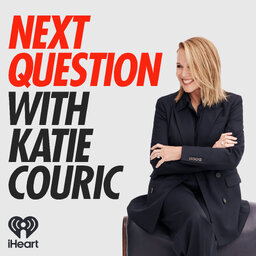A Balance of Being and Doing: Jay Shetty on Purpose in Work, Life, and Love
Like many influencers these days, Jay Shetty is much discussed, but not necessarily much understood. He seems like he’s everywhere–officiating JLo and Ben Affleck’s wedding, dispensing wise sound bites on TV, and connecting daily to nearly 50 million people across a variety of social media and other platforms. Shetty rejects the title “guru,” which some have used to describe him, but it’s easy to see that he’s a guiding light for many. Shetty strives to create spaces where true vulnerability and openness is possible, and he brought a sense of peace and calm to this wide-ranging interview which traces his path from “failed” monk to household name. Together, Katie and Jay explore the power of unconditional love, and how to take self-care from buzzy jargon to practical tactics for bringing more peace into our lives.
 Next Question with Katie Couric
Next Question with Katie Couric


